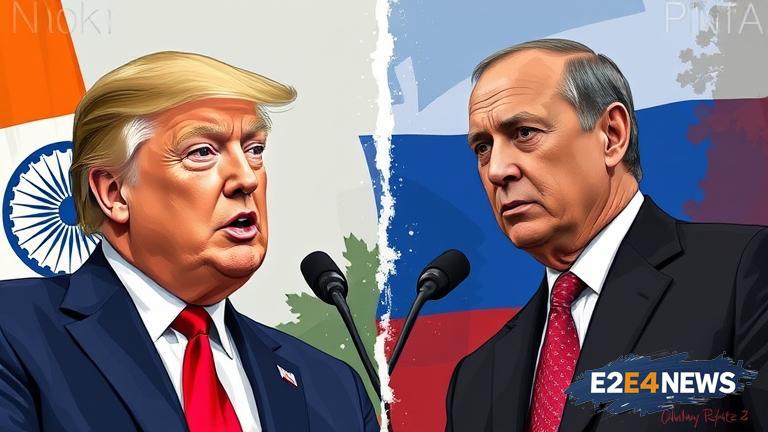The United States and India are embroiled in a trade dispute, with President Trump threatening to penalize India for its decision to continue importing oil from Russia. The move has sparked concerns over the potential economic implications for both countries. India, which is the third-largest oil consumer in the world, has been seeking to diversify its energy sources and reduce its dependence on Middle Eastern oil. The country has been importing oil from Russia, despite US sanctions on Russian oil exports. The US has been pressuring India to stop importing oil from Russia, citing concerns over Russia’s actions in Ukraine and its alleged meddling in US elections. However, India has refused to comply, citing its need for energy security and its long-standing relationship with Russia. The US has threatened to impose penalties on India, including sanctions on Indian companies that continue to import oil from Russia. The move has sparked concerns over the potential impact on the Indian economy, which is already facing challenges due to the COVID-19 pandemic. The Indian government has been trying to negotiate with the US, seeking a waiver from the sanctions. However, the US has refused to budge, citing its commitment to enforcing its sanctions on Russia. The dispute has also sparked concerns over the potential impact on global oil prices, which could rise if India is forced to stop importing oil from Russia. The US has been seeking to reduce its dependence on foreign oil, and has been promoting its own oil exports. However, the move has sparked concerns over the potential impact on the environment, as well as the potential for increased tensions with other oil-producing countries. The dispute has also highlighted the challenges facing the US-India trade relationship, which has been under strain in recent years. The two countries have been negotiating a trade deal, but the talks have been slow to progress. The US has been seeking greater access to the Indian market, while India has been seeking greater access to the US market. The dispute over the Russia oil trade has added a new layer of complexity to the trade talks, and has sparked concerns over the potential impact on the global economy. The Indian government has been trying to diversify its energy sources, and has been seeking to increase its use of renewable energy. However, the country still relies heavily on fossil fuels, and the dispute with the US has sparked concerns over its energy security. The US has been promoting its own energy exports, including liquefied natural gas (LNG), as a alternative to Russian oil. However, the move has sparked concerns over the potential impact on the environment, as well as the potential for increased tensions with other energy-producing countries. The dispute has also highlighted the challenges facing the global energy market, which is undergoing a significant transition. The move towards renewable energy is gaining momentum, but the transition is expected to be slow and complex. The dispute between the US and India has sparked concerns over the potential impact on the global energy market, and has highlighted the need for greater cooperation and diplomacy. The US and India have a long-standing relationship, and the dispute has sparked concerns over the potential impact on their bilateral ties. The two countries have been cooperating on a range of issues, including counter-terrorism and defense. However, the dispute over the Russia oil trade has added a new layer of complexity to their relationship, and has sparked concerns over the potential impact on their bilateral ties. The Indian government has been trying to navigate the dispute, and has been seeking to find a solution that meets its energy needs while also addressing US concerns. However, the move has sparked concerns over the potential impact on the Indian economy, and has highlighted the need for greater cooperation and diplomacy.





